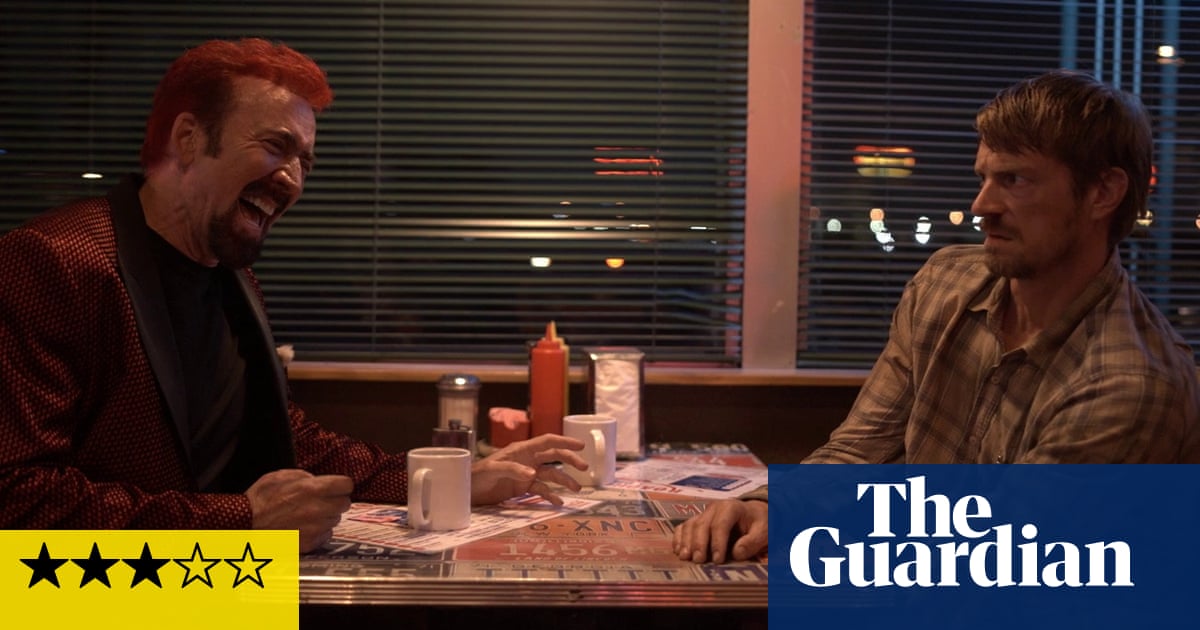
ound about the time an acquaintance of mine got a Nicolas Cage tattoo – those mournfully stretched features and wide, restless eyes eerily emblazoned on her forearm – I realised that his career, already one of many corners, had turned another. Having moved through the phases of indie oddball, Oscar-winning serious thespian and multiplex marquee name, he seemed at risk of becoming a direct-to-DVD trash king, an ignoble joke.
If there’s any joke here, however, Cage and his loyal cult have decided to be in on it. Cue a 2021 comeback plan that includes playing himself in the forthcoming action comedy The Unbearable Weight of Massive Talent, playing Joe Exotic in the inevitable Tiger King dramatisation, and hosting Netflix’s quirky new documentary series History of Swear Words. The show does what it says on the tin, albeit not in great depth or detail: its real raison d’être is getting Cage to swear with lavish, regal dignity, and he holds up his end of the bargain.
It’s a long way from the mid-1980s, when the young Cage seemed bound for a career playing a narrow spectrum of lunkheads. He was winningly goofy in Martha Coolidge’s offbeat teen romcom Valley Girl (1983; on iTunes), while his uncle Francis Ford Coppola threw him a couple of bones. He was a suitably brooding ensemble presence in Rumble Fish (1983; on Chili), but by the time he graduated to a major role in 1986’s Peggy Sue Got Married (on Amazon Prime), he seemed on another planet to everyone else in Coppola’s dinky retro fantasy. By 1987, Cage’s persona clicked into place. He was so perfectly mismatched with Cher in Moonstruck (on Amazon Prime Video) as to be irresistible, even if no film would ever cast him quite so swooningly again, while his screwed-up screwball energy in the Coen brothers’ Raising Arizona (1987; on Chili) was so in tune with theirs, you have to wonder why they never collaborated again.
Full-tilt Crazy Cage arrived soon after in Vampire’s Kiss (1988; on iTunes), which may still be his greatest performance. As a yuppie literary agent turning swiftly and manically into a creature of the night, he plays it like Patrick Bateman with every inward impulse turned flagrantly outwards. He deserved Oscar consideration for it, though that eventually came in 1995. Cage won for his sensitive, shaded turn as an alcoholic screenwriter in Mike Figgis’s Leaving Las Vegas (on Google Play), a film that was extravagantly acclaimed on its release, though now seems just a little put-on in its gloom. The Academy, it seems, only likes Cage as morose screenwriters: his only other nomination came for heroically playing Charlie Kaufman’s alter ego – and said alter ego’s dimwit twin – in Adaptation (2002; on Netflix).
The Oscar sealed Cage’s status as a star, which he then unexpectedly parlayed into a brash action-man transformation. It’s a shift that gave us the enduring explosive theatrics of The Rock (1996; on SkyGo) and Face/Off (1997; on Chili), though precious little else from that era is a keeper. Beginning with his bizarre casting as a depraved cop in Werner Herzog’s frankly demented Bad Lieutenant: Port of Call New Orleans (2009; on Amazon Prime Video) – a film that, love it or hate it, does feel like a genuine meeting of two unhinged minds – Cage has let his freak flag fly again.
In Panos Cosmatos’s psychedelic, lava-soaked revenge horror Mandy (2018; on Chili), the actor found his best vehicle in ages. As with his snakeskin-clad rockabilly turn in David Lynch’s Wild at Heart (1990; on Amazon Prime Video), he’s at home in film-making that matches him for volume and eccentric extravagance. Watching him underplay – rather well, as in David Gordon Green’s solemn Texas coming-of-age tale Joe (2013; on Curzon Home Cinema) – somehow feels like more of an act. Once he’s through sending himself up on Netflix, Cage is likely to surprise us several times more.
Also new on streaming and DVD
This Is Not a Burial, It’s a Resurrection
(Mubi)
Making its UK debut via Mubi next week is one of the most extraordinary films I saw in 2020: a rare shot of cinema from the enclaved southern African country of Lesotho. Lemohang Jeremiah Mosese’s starkly original vision blends rustic vérité with soaring, folkloric surrealism in its study of a widowed 80-year-old villager (the late South African veteran Mary Twala, in an exquisite screen farewell) standing quietly firm against government orders to move from their ancestral land – captured as a series of vast, brilliant but not-too-postcardy landscapes and skyscapes. Both a powerful environmental parable and a hard-gazing, devastated character study, immersed in unfamiliar cultural and geographical detail, it is not to be missed.
Liberté
(Second Run, 18)
Radical Spanish auteur Albert Serra hit on something bewitching with his languid historical drama The Death of Louis XIV, but this Sadeian erotic all-nighter – it takes place from dusk to dawn, but feels that long too – is a misfire, strangely dreary for a period fantasia featuring all manner of pansexual body-fluid frolics. It has its champions, though, and Serra’s technique remains pristine.
Miss Juneteenth
(Sky Cinema, 15)
A bright supporting presence in the likes of Steve McQueen’s Shame and TV’s Black Mirror, Nicole Beharie has long deserved a leading vehicle as substantial as Channing Godfrey People’s warm, thoughtful mother-daughter drama. As a former Texas beauty queen trying to steer her daughter away from her own past errors, she gives the film a beating but broken heart.












